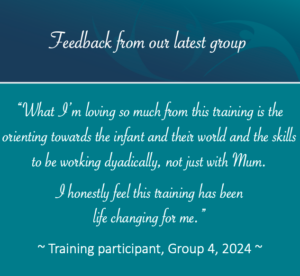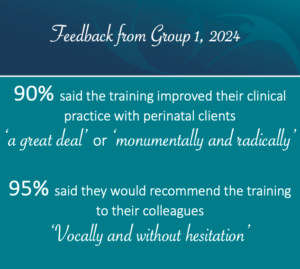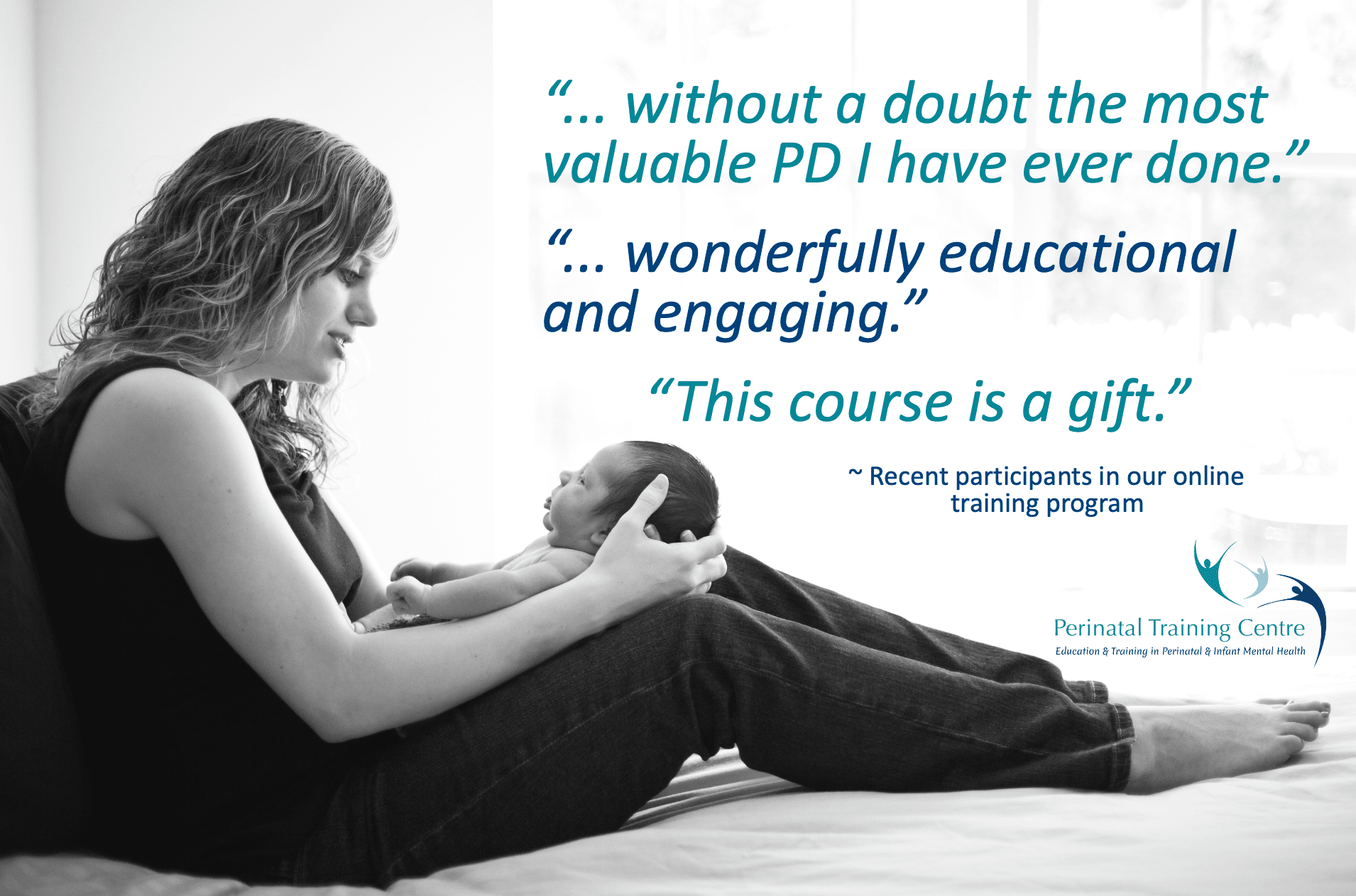

Perinatal and infant mental health is a dedicated area of practice focusing on the emotional health and development of parents and infants.
The perinatal period is a vulnerable time for all members of the family. It is the time of highest risk for a woman to develop, or have a reoccurrence of, a mental health condition; while men are also at increased risk of depression and anxiety during this life phase. Where parental mood disturbance is present, working clinically with only parental symptomatology is insufficient to address issues within the parent-infant relationship. By contrast, working with the parent-infant dyad can help both parental mood symptoms and relationship difficulties.
Infancy is a foundational developmental time, and infants bring with them their own unique capacities and vulnerabilities. Their social, emotional and relational development is embedded within the caregiver relationship. Where parents have relational or mental health difficulties, their capacity to get to know their baby and meet their needs with attuned clarity may be compromised. Clinicians hold an important role in supporting parents to get to know their baby and optimally meet their baby’s development needs.
This training program provides an overview of assessment, formulation and treatment in both the antenatal and postnatal phases incorporating the mother, father/non-birthing partner and infant with a focus on their development and the quality of their relationships. Theories of development, attachment, interaction, object-relations, behaviour and cognition are incorporated. Participants can expect an exploration of theoretical models and practical applications in working therapeutically with parents, infants and the parent-infant relationship. Detailed case studies are presented to strengthen formulation and treatment planning skills, with a focus on the parent-infant relationship and attachment themes.
Complimentary ongoing support is available beyond this training program through our Perinatal Conversation Hour. These monthly meetings enable further integration of the workshop material into your practice. The consultations provide opportunity to discuss effective ways to integrate the material covered in the program in meaningful ways to your practice setting and the families you serve.
Live workshop meetings are facilitated by Dr Bronwyn Leigh. The emphasis is on therapeutic frames, formulation and intervention at an advanced level.
The weekly frequency of live meetings allows for regular digestion of content and process, while providing opportunity for the application of material in your therapy work between meetings.
Live training and participation are key to learning. Reflecting together on these complex and integrated approaches to PIMH allows for strengthening of the ‘reflective muscles’ necessary for effective therapeutic work in perinatal and infant mental health. Pre-recorded, or on-demand training, while useful for access to information, cannot replicate the necessary experiential learning required for therapists.
Approx. 5-hrs total
Pre-recorded lectures compliment the live meetings and orient participants to concepts that are then explored and expanded as a group in the workshops.
Participants are invited to actively reflect on the material as it is relevant to the families and communities they serve, to personalise the information and optimise the training experience.
More information by clicking on the various tab headings above.
Our signature training package is designed for multidisciplinary health professionals either currently working with, or who have a desire to work with, families during the perinatal period from a relational and developmental perspective. The training program is primarily targeted at those working in an ongoing therapeutic capacity with parents and their infants. In particular, this workshop is ideal for those who would like to include the infant and parent-infant relationship in the treatment of parental mood disturbance.
It is advisable not to engage in this training while pregnant or in the early postpartum.
Stable internet connection with camera and sound is required. The Zoom platform is used for the video conferencing meetings.
Please ensure you will be in a quiet, private space during the live meetings.
As this is a post-graduate level training, experience in mental health work is assumed. Assumed knowledge: experience in general assessment, diagnosis, formulation and treatment planning of mental health conditions. Please contact us if you have queries about this.
Knowledge of the Australian Clinical Practice Guideline is assumed. The ‘Mental Health Care in the Perinatal Period’ (Austin, M-P, Highet, N. & the Expert Working Group, 2017) document should be familiar to participants prior to the training.

This training program focuses on both knowledge acquisition and clinical skills development.
Participants are expected to engage in supplemental learning between live Sessions. Activities include viewing video tutorials (about 5-hrs), reading and reflective exercises. Participants should allow up to 1.5hrs of supplementary learning each week between Sessions. It is expected participants will attend all Sessions live.
*Please note that this is a live training event and attendance and participation are expected.*
Please be sure to check all the dates and times for the training and be sure you can attend. However, I understand that things come up and it may not be possible to attend every session live. In the event that you cannot attend live due to an unforeseen event (eg, illness), the session will be recorded so you can watch later and do not miss the content.
To receive a Certificate of Attendance for the training, no more than 2 sessions can be missed as participation is key to learning.

Registration Fee: $3375
$875 deposit required at Registration
Balance due at least 4-weeks prior to commencement of training and can be made as a single payment of $2500 or two instalment payments of $1250.
Cost includes GST and all participant inclusions
Cancellation Policy
Cancellations: Full amount less $100 admin fee will be provided for cancellations received in writing up to two weeks prior to event. No refund after this time but registration is transferrable to another person to attend the same workshop.

BREAK 2-week break *daylight savings times ends 07 April – AEST from now
*AEDT = Australian Eastern Daylight Time
AEST = Australian Eastern Standard Time
When moving from AEDT to AEST the clock in Melbourne/Sydney moves backwards by one hour, that means for those of you not changing from daylight savings times, we will meet 1-hr later. Please be sure to check the time in your location.
This meeting planner can help.
2-week break – times change to AEDT*
[no meeting 04 November due to Cup Day holiday]
*AEST = Australian Eastern Standard Time
AEDT = Australian Eastern Daylight Time
When moving from AEST to AEDT the clock in Melbourne/Sydney moves forwards by one hour, that means for those of you not changing to daylight savings times, we will meet 1-hr earlier. Please be sure to check the time in your location.
This meeting planner can help.

Dr Bronwyn Leigh is a Clinical Psychologist, perinatal and infant clinician and early parenting consultant. She is the Director of the Perinatal Training Centre and the Centre for Perinatal Psychology. Bronwyn specialises in the psychological aspects of becoming a parent, the emotional development of infants, and parent-infant relationships. She has contributed to research in the areas of maternal mood, prematurity and early parenting difficulties, and has been a national trainer in perinatal loss counselling. She was the founding member and inaugural National Convener of the Australian Psychological Society’s Perinatal and Infant Psychology Interest Group (PIPIG). Bronwyn is experienced in the provision of clinical supervision, training and consultancy and has published in academic journals, presented at conferences and provided media interviews. Bronwyn co-authored Towards Parenthood: Preparing for the Changes and Challenges of a New Baby (ACER Press, 2009) a self-help reflective guidebook for parents during pregnancy and in the first year after having a baby.
Bronwyn has facilitated this PIMH training since 2012. It started as a 2-day workshop but the feedback was overwhelmingly that participants wanted more! It is currently offered as an expanded version. It has run in Cairns, Brisbane, Sydney, Darwin, Alice Springs, Melbourne, Launceston and Hobart with participants from around Australia and overseas.
Bronwyn has facilitated training in PIMH for various organisations and government agencies both in-person and online, including the Northern Territory Government (Darwin and Alice Springs), Government of South Australia, DHHS Victoria, Centacare and the Mater Hospital.
Subscribe to our Newsletter to stay connected and keep up with all our activities.